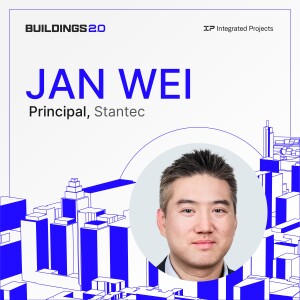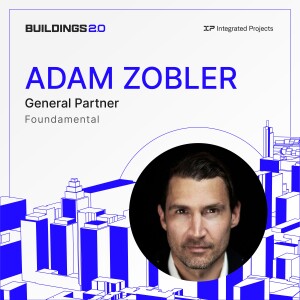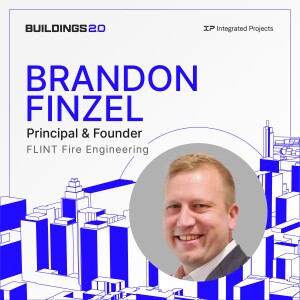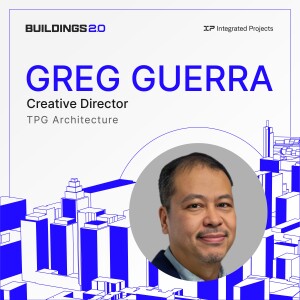Buildings 2.0
Buildings 2.0 dives deep into the technology, trends and talent reshaping the structures where we live and work. Hosted by Jose Cruz Jr, this podcast brings you interviews with the industry’s brightest minds, from visionary architects and property owners to chief innovation officers. Brought to you by Integrated-Projects.com.
Episodes

Thursday Sep 19, 2024
Thursday Sep 19, 2024
In this episode of Buildings 2.0, Jose speaks with Jan Wei, Principal at Stantec, to explore the relationship of building optimization and sustainability. Jan discusses the transformative role of digital twins, which create virtual replicas of buildings to simulate and enhance performance and efficiency. He explains how these digital models can predict and solve system failures before they occur.
Jan also addresses the challenges and strategies for complying with New York City's Local 97 sustainability regulations, emphasizing the critical role of energy management and optimization. Jan shares valuable career advice for aspiring engineers, highlighting the importance of staying curious, getting involved in industry advancements, and focusing on emerging trends such as AI in building design.
Topics discussed:
How digital twins create virtual replicas of buildings to simulate and optimize performance, predicting and preventing system failures.
Strategies for building owners to meet stringent sustainability regulations, emphasizing the importance of energy management and optimization.
Tips for aspiring engineers, including staying curious, getting involved in industry advancements, and focusing on emerging trends.
Best practices for measuring and managing energy use to meet regulatory standards and improve building efficiency.
Addressing common issues building operators face, including lack of understanding in optimizing operations and advanced technology requirements.
How predictive analytics can help in optimizing building performance by anticipating and addressing potential issues before they escalate.
The importance of collaboration among various stakeholders, including building owners, operators, and designers, to achieve compliance and sustainability goals.
How AI is revolutionizing building design, making it more efficient and sustainable.
Insights on how academic knowledge can be applied in real-world scenarios, emphasizing the importance of a solid educational foundation.
Emerging trends that will shape the future of building technology, including advancements in materials and smart building systems.

Thursday Sep 12, 2024
Thursday Sep 12, 2024
In this episode of Buildings 2.0, Jose speaks with Charlie Miller, Principal at M5 Advisors, about the transformative role of digital technology in commercial real estate. Charlie shares his journey from graphic design to leading digital strategy, emphasizing the importance of early integration of tech solutions in the design process to enhance user experience and investment outcomes.
He discusses how tenant apps are revolutionizing communication between building operators and users, making buildings more connected and efficient. Additionally, Charlie delves into the potential of AI tools in generating innovative design ideas, optimizing feasibility studies, and improving overall operational efficiency.
Topics discussed:
The importance of incorporating digital solutions early in the real estate design process for optimal outcomes.
How the rise of tenant apps is revolutionizing communication and relationships between building operators and users, enhancing overall building management.
Exploration of AI tools to generate innovative design ideas and improve feasibility studies, streamlining the development process.
Charlie's journey from a graphic designer to a principal at M Five Advisors, highlighting the transferable skills and insights.
The difficulties of designing financial models to justify tech investments in commercial real estate.
Insights into navigating the complex vendor landscape and evaluating ROI for technology solutions in real estate projects.
The need for fostering collaboration and knowledge-sharing within the real estate industry to overcome technology integration challenges.
How digital tools and AI can assist in innovative design methods and improving overall building functionality.

Thursday Sep 05, 2024
Thursday Sep 05, 2024
In this episode of Buildings 2.0, Jose speaks with Bill Seery, Prefabrication Director at Consigli Construction, to explore how prefabrication is shaping the future of the construction industry. Bill discusses the transformative potential of industrialized construction, including saving time spent — and sometimes wasted — on waiting for delivery or making various adjustments.
He highlights how modern technologies like AI, drones, and video capture can significantly enhance safety and productivity on construction sites. Bill also emphasizes the critical role of long-term partnerships and collaboration between general contractors and subcontractors for sustainable success.
Topics discussed:
The shift towards industrialized construction and its potential to revolutionize efficiency and quality in the building industry.
The integration of technologies like AI, drones, and video capture to enhance safety, efficiency, and productivity on construction sites.
The importance of fostering long-term partnerships and collaboration between general contractors and subcontractors for sustainable project success.
The advantages of prefabrication in construction, including reduced on-site labor, improved quality control, and faster project timelines.
Transitioning from traditional project-based methods to a productization mindset to streamline construction processes and improve outcomes.
Comparing traditional economic models with those suggested for industrialized construction to highlight potential cost savings and efficiency gains.
Addressing the challenges of skilled labor shortages and how industrialized construction can mitigate these issues.
Considering the regulatory, social, and economic impacts of adopting industrialized construction practices in the industry.
The future of housing, especially in urban areas like New York, and how industrialized construction can meet growing demands efficiently.

Thursday Aug 29, 2024
Thursday Aug 29, 2024
In this episode of Buildings 2.0, Jose speaks with Zak Kostura, Associate Principal & Digital Services Portfolio Leader for Americas East at Arup. Zak shares his expertise on the transformative potential of AI in addressing complex design challenges, the importance of managing digital teams to optimize project outcomes, and the pivotal role of digital tools in providing flexible, innovative solutions to client problems.
Zak's insights highlight how technology is reshaping the design and construction industry, making this episode a must-listen for professionals looking to stay ahead in an ever-evolving field. He also does a deep dive into the future of design and construction technology.
Topics discussed:
The importance of managing practitioners to optimize project outcomes by understanding and effectively utilizing technology.
How AI can address complex design challenges and improve project efficiency and innovation.
The pivotal role of digital tools in providing flexible, innovative solutions tailored to client needs.
How technologists can act as consultants to solve client problems elegantly and effectively.
Finding instances where an idea shows potential for scalability and applying it across various projects.
How digital products can serve as new touchpoints for clients, offering valuable insights into their design needs.
Approaches to selecting the right technology for a project by understanding design team priorities and client requirements.
The importance of bringing subject matter experts together to enhance design outcomes.
The role of data engineering and data science in modern design and construction projects.
Encouraging professionals to be open to changing methodologies and defining their value in an evolving industry.

Thursday Aug 22, 2024
Thursday Aug 22, 2024
In this episode of Buildings 2.0, Jose speaks with Adam Zobler, General Partner at Foundamental, who shares his insights on the evolving landscape of venture capital within the built environment. He emphasizes the critical importance of empathy in understanding industry pain points and how this knowledge can guide effective investment decisions.
Adam also discusses the necessity of a customer-centric approach, urging founders to engage directly with their ideal customers to refine their products and enhance market fit. Additionally, he highlights the need for agility in navigating market dynamics, enabling startups to seize emerging opportunities.
Topics discussed:
The importance of understanding industry pain points to make informed investment decisions that truly support startups.
How engaging directly with customers is vital for founders to refine their products and ensure they meet real market needs effectively.
The necessity for startups to remain agile and responsive to changing market conditions to capitalize on new opportunities.
Why founders should actively seek customer feedback to enhance their offerings and adapt their go-to-market strategies for better alignment.
The need for a strategic, long-term vision in addressing decades-long industry challenges while measuring success in meaningful increments.
The growing trend of investing in robotics and automation to address labor shortages and improve operational efficiency in various sectors.
The value of leveraging networks and connections is highlighted as a crucial resource for startups seeking funding and strategic partnerships.
The fast-paced nature of the industry, where companies must innovate quickly to stay ahead of competitors and market shifts.
Examples of successful companies that have effectively navigated challenges and achieved significant market impact through innovative solutions.
The evolving role of venture capital in supporting startups, particularly in sectors facing significant transformation and disruption.

Thursday Aug 15, 2024
Thursday Aug 15, 2024
In this episode of Buildings 2.0, Jose speaks with Rion Philbin, Design Architect and Owner of No So Studio. Rion shares his journey, highlighting the importance of trusting one's judgment and navigating a career in architecture. He dives into the ongoing challenges and opportunities in sustainable design, emphasizing the need for thoughtful and conscious industry practices.
Additionally, Rion explores the transformative role of AI in the creative process, discussing how new technologies can enhance efficiency while preserving human creativity. He offers valuable takeaways for design enthusiasts and professionals alike.
Topics discussed:
The importance of trusting one's own judgment over external feedback in both personal and professional life.
The ongoing challenges and opportunities for achieving true sustainability in architectural design and industry practices.
How AI is transforming the design process, enhancing efficiency while maintaining the integrity of human creativity.
The significance of good client relationships in producing high-quality, meaningful design work.
Comparisons and contrasts of design principles between healthcare and residential projects, including recurring themes and unique challenges.
The use of collage as a technique in navigating projects and how it fits into a broader toolbox of design methods.
Emerging trends in architecture, including technical, social, and regulatory changes that influence design practices.

Thursday Aug 08, 2024
Thursday Aug 08, 2024
In this episode of Buildings 2.0, Jose speaks with Charu Chaudhry, Associate Principal at Thornton Tomasetti, to explore the fascinating world of historical building preservation. Charu shares her journey from working on 10th century Buddhist monasteries in India to tackling 18th century rowhouses.
Charu offers her insights into balancing historical preservation with modern needs, leveraging technology like scanning for accurate data collection, and redefining sustainability through durability and long-term building performance. Charu’s expert perspective provides a fresh perspective on how to honor the past while embracing the future in building design.
Topics discussed:
How to maintain the integrity of historical buildings while incorporating contemporary requirements and innovations.
Leveraging modern tools like scanning and data collection to accurately analyze and preserve historical structures.
Redefining sustainability by focusing on the long-term performance and durability of building materials and structures.
Using analytics and a deep understanding of materials to enhance the performance and longevity of historical buildings.
Discussing specific projects, such as 18th-century rowhouses, and the unique challenges and solutions involved.
Conducting hydrothermal studies to understand the performance of building envelopes and improve their preservation.
Methods to analyze stress concentrations in historical buildings and how this informs preservation strategies.
The importance of working with various organizations and stakeholders to achieve successful preservation outcomes.

Thursday Aug 01, 2024
Thursday Aug 01, 2024
In this episode of Buildings 2.0, Jose speaks with George Kontaroudis, Principal Architect at kw/h architecture, to explore his journey from growing up in Greece to becoming a leader in sustainable architecture. George shares valuable insights on the critical role of sustainability in reducing global CO2 emissions, emphasizing the need for near-zero environmental impact designs, including becoming an advocate for passive house design.
He also dives into the transformative impact of AI on architectural workflows, explaining how it streamlines initial design phases while still requiring human oversight. Additionally, George highlights the importance of effective communication and humility in successful project collaborations.
Topics discussed:
How early mentorship and internships can shape a young architect's understanding and appreciation of design.
The importance of reducing CO2 emissions through sustainable design principles and creating buildings with near-zero environmental impact.
How AI is revolutionizing architectural workflows by streamlining initial design phases, such as massing studies, while still needing human oversight.
George's philosophy on using materials authentically and how this influences his design approach and project outcomes.
Strategies for maintaining clear and effective communication with contractors and clients to ensure successful project execution.
The value of humility and continuous learning when working with diverse teams on architectural projects.
How AI can provide multiple options for massing studies, saving time during the early design stages.
Approaching conversations with clients to discuss long-term benefits and sustainable design choices.
The evolving role of technology and AI in architecture and what young architects should consider for future success.

Thursday Jul 25, 2024
Thursday Jul 25, 2024
In this episode of Buildings 2.0, Jose speaks with Brandon Finzel, Principal & Founder at FLINT Fire Engineering. They explore the evolution of building codes and how cities like Boston are setting the standard for others to follow.
Brandon offers insights into the impact of technology on building management systems, highlighting how advanced tools can enhance efficiency and safety. He also gives his predictions for the future of commercial building experiences, offering a glimpse into the next decade of construction innovations.
Topics discussed:
How building codes have changed over the past few decades and the role of cities like Boston in setting new standards.
Insights into how advanced technology is being integrated into modern building management systems to enhance efficiency and safety.
Predictions on what the experience within commercial buildings will look like in the next decade, including emerging trends and innovations.
The importance of involving various disciplines early in the design process to address complex challenges in building projects.
How building resiliency tests are crucial to ensure that projects can withstand various stressors and maintain functionality.
Analysis of which sectors, such as commercial or institutional, show more urgency in adapting to the latest advancements in the field.
The necessity of creating detailed code compliance reports early in the project lifecycle to avoid issues during the design and construction phases.
The significance of understanding and precisely defining terms in building codes to ensure clarity and compliance.
How technology enables collaboration with experts worldwide, allowing them to contribute to projects regardless of their physical location.
The benefits of involving stakeholders, including designers and code consultants, at the initial stages of a project to set a clear direction.

Thursday Jul 18, 2024
Thursday Jul 18, 2024
In this episode of Buildings 2.0, Jose speaks with Greg Guerra, Creative Director at TPG Architecture, to explore the evolving landscape of workplace design. Greg dives into the importance of balancing hybrid work with in-person collaboration, while ensuring that office spaces remain relevant and functional for years to come.
He also highlights the critical role of effective communication in translating client needs into innovative design solutions. Greg shares his thoughts on fostering creativity and encouraging young architects to voice their ideas as well as finding mentors to help guide and shape their careers.
Topics discussed:
The importance of translating client needs into compelling, understandable designs through model making and drawings.
The challenges and strategies for balancing remote work with in-person collaboration in the evolving workplace environment.
How to design office environments that remain functional and relevant for many years, adapting to changing needs and technologies.
The necessity of deeply understanding and listening to clients to create designs that truly meet their needs and aspirations.
The importance of younger team members speaking up and contributing their ideas during project meetings.
The rising focus on office amenities to attract employees back to physical workspaces and enhance overall workplace satisfaction.
The value of seeking out mentors and how mentorship can significantly impact an architect's career development and growth.
The benefits of in-person collaboration, particularly the speed and efficiency of idea generation and problem-solving during face-to-face interactions.


